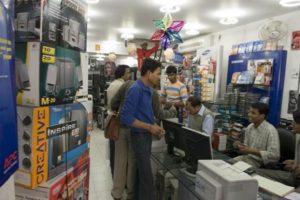
The NITI Aayog, has discarded its first keen ‘Make in India Strategy for Electronic Products’ and has introduced another export-oriented policy that favours developing coastal economic zones.
Due to its pro-domestic focus and emphasis on semiconductors, the previous policy paper faced opposition from the Ministry of Electronics & Information Technology as well as reservations from other stakeholders. “They had floated a policy paper once that never went forward since many people had reservations on it,” a senior ministry said. The ministry is, however, fully supportive of the second draft paper submitted by the think tank, he added.
“They are talking of port-based electronic manufacturing clusters. They seem to have discussed it with the industry and then floated the paper. It’s a good paper, which nicely analyses the prospects. We are fully supportive of it. However, it is still a policy paper and may take some time to take shape,” the official said.
“The idea is to promote greater exports of electronics and drive larger investments. We have achieved a certain level in terms of manufacturing so far and this will take it to the next level.”
NITI Aayog initially came up with a draft policy that sought to attract global electronic manufacturers to set up units in India and give a push to the Make in India initiative. It suggested a 10-year tax holiday for companies investing over $1 billion in electronics manufacturing or creating 20,000 jobs in India. India’s domestic consumption of electronics hardware was $63.6 billion in 2014-15, with imports accounting for 58% of the total.
It has now been canceled and a proposal to set up coastal economic zones for labour-intensive sectors in the country is recommended, much along the lines of China, to enable manufacturers to tap overseas markets without much difficulty.
“We are not pursuing the electronics policy as the Aayog is pushing for comprehensive coastal economic zones, which would serve the purpose and would be a better option,” Aayog vice chairman Arvind Panagariya said. Besides, the think tank was of the view that the sector needed an export-oriented strategy to cater to the global market, which exceeds $2 trillion.
NITI suggested that the country needs to forge free-trade agreements to create duty-free markets for electronic goods. It had said India’s current approach with respect to such agreements is defensive because it is a bigger importer of electronic products than an exporter.
An industry official said the policy paper could not fructify since it talked about investments from semiconductor companies, something that appears impossible to pursue at the moment.


















